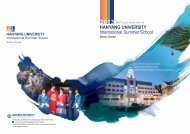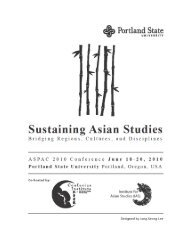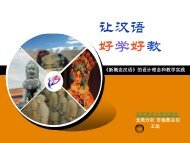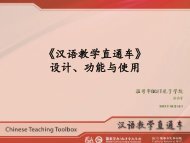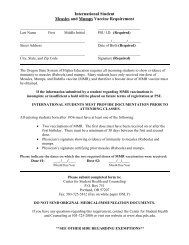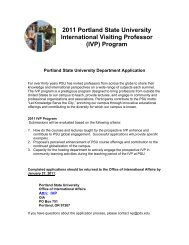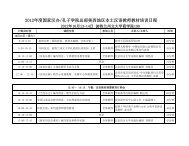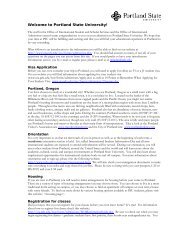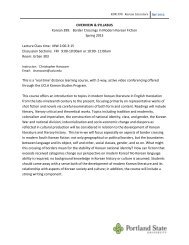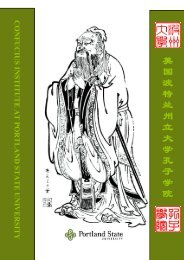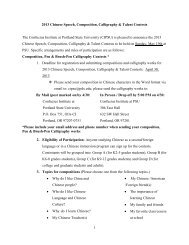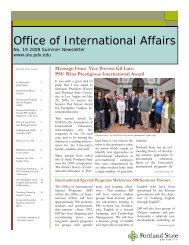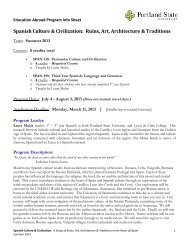ABSTRACTS - oia - Portland State University
ABSTRACTS - oia - Portland State University
ABSTRACTS - oia - Portland State University
You also want an ePaper? Increase the reach of your titles
YUMPU automatically turns print PDFs into web optimized ePapers that Google loves.
ASPAC Conference 2010<br />
June 18 – 20, 2010 | <strong>Portland</strong>, OR<br />
Manchurian-born Chinese woman with the explicit or implicit purpose to legitimize and promote Japan’s<br />
imperialist enterprise in occupied territories in China. Narrowly escaping treason charges and possible<br />
execution by Chiang Kai-shek’s Kuomintang (Nationalist Party) after Japan’s surrender by finally revealing<br />
her Japanese identity, Yamaguchi proceeded to rehabilitate her cinematic career after 1945 by first appearing<br />
as Shirley Yamaguchi in Hollywood and Broadway productions in the 1950s. Upon returning to Japan, she<br />
emerged as a popular Japanese television host in 1967 and served as a three-term representative in the Upper<br />
House of the Japanese Diet from 1974-92. This was followed by her stint as a vice-president of the Asian<br />
Women’s Fund to assist former comfort women in Asia. While publicly expressing shame, guilt, and remorse<br />
as she contemplated her wartime role as a theatrical puppet in the puppet state of Manchukuo, it is also<br />
undeniable that Yamaguchi had at the same time been a convenient pawn and a willing accomplice of Japan’s<br />
colonial ideology and its pan-Asian rhetoric. By studying Yamaguchi’s Man’ei career and her postwar writings<br />
including her well-known autobiography Ri Kōran: My Early Life (Ri Kōran: Watashi no hansei, Tokyo:<br />
Shinchōsha, 1987), my paper seeks to illuminate the boundaries and ambivalence between colonizing<br />
hierarchies and transracial cinema in the politics of imperialism, between national identity and transnational<br />
performance, as well as between the intricate roles of the colonial victimizer and the colonized victim.<br />
~ ~ ~ ~ ~ ~ ~ ~ ~ ~<br />
Zhongping Chen<br />
The Reformist Wave Across the Pacific: Kang Youwei and the Empire Reform Society in Canada, 1899-1911<br />
This paper examines how the well-known Chinese exile, Kang Youwei, first founded the Empire Reform<br />
Society (Baohuang hui) in Canada in 1899 and then used it to promote sociopolitical changes in Canadian<br />
Chinatowns and late Qing China. Because Kang’s organization later spawned more than one hundred<br />
branches in the Americas, Asia and Australia, its early leaders and activities in Canada were especially<br />
influential in the transpacific Chinese politics. While previous scholarship has often stressed how Kang and<br />
his organization used overseas Chinese support to promote constitutional reform in China, this study will<br />
further investigate how such political struggle inspired sociopolitical changes in Canadian Chinatowns,<br />
including the development of new community associations, educational institutions, and social movements<br />
such as an anti-opium campaign. It will also reveal how Kang’s organization helped the Chinese in Canada<br />
fight racism and push for new relations with the Canadian government and society. In particular, this paper<br />
will go beyond previous studies of competition between reformers and revolutionaries in the Chinese<br />
diaspora, and intead will highlight how Kang’s organization linked up Chinatowns throughout the entire<br />
Pacific area, especially Western Canada. Based on previously unknown archives and other primary sources,<br />
this paper will provide fresh food for theoretical reflections on modern Chinese history and the Chinese<br />
diaspora.<br />
~ ~ ~ ~ ~ ~ ~ ~ ~ ~<br />
Gaye Christoffersen<br />
Chinese Approaches to East Asian Maritime and Energy Cooperation: China's Evolving Identity in Multilateral Regimes<br />
China's participation in East Asian multilateral regimes has been explained using the concept of the<br />
"Harmonious World," a "Harmonious East Asia," and "Harmonious Seas." Chinese scholars have offered<br />
various theoretical explanations for the existence of the "Harmonious World," offerings that range from<br />
Realist to Social Constructivist to Neo-Liberal Institutionalist. Additionally, these scholars attempt to create<br />
a more Chinese theory of international relations within a Chinese framework. This scholarly work seeps into<br />
Chinese policy thinking because Chinese academics also serve as policy advisors to the government. This<br />
interaction of scholars and policy practitioners facilitates a redefinition of China's identity and role in the<br />
world and enables Chinese participation in regional multilateral regimes by redefining Chinese national<br />
interests within these regimes. This paper will examine contemporary Chinese scholarly theoretical work and<br />
assess to what extent it is used as a framework for China's evolving role in energy multilateral regimes and<br />
maritime cooperation projects.<br />
~ ~ ~ ~ ~ ~ ~ ~ ~ ~<br />
7



